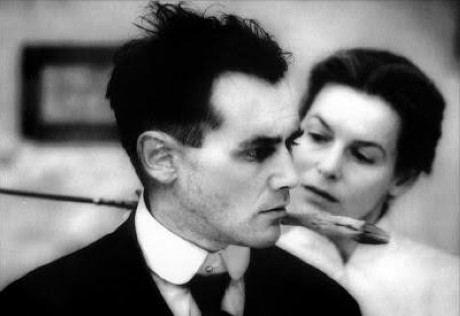


Quay Brothers at DOK Leipzig

It started at 7pm and ended at 10.30pm with half an hour break. 90 minutes talk with Stephen and Timothy Quay followed by the screening of their live action film (105 minutes) ”Institute Benjamenta”. (PHOTO)
It was an entertaining night with the two famous world artists – only 50 people came! You can do better than that Dok Leipzig! Was it because you
had placed the event, for me the scoop of the festival, at Schaubühne which is not in the centre, where the other screenings took place? Was it because you asked us accredited guests for 12€ as an entrance fee that many hesitated? Or is it simply because a younger audience in general does not know their magnificent pieces of art? Or had not read the great article written by the Brothers for the festival catalogue? Or did not appreciate the trailers, 3 of them, made specifically for the festival. Another grumpy remark: the sound is terrible at Schaubühne.
Anyway for those who missed it and would like to catch up, go to Youtube and find a lot of films made by the Brothers. And a 8 minutes long documentary look into their studio made by Christopher Nolan.
So there they were telling the story of how they entered the world of puppet animation as their contribution to visual art at the highest level. They had gone to the art college, they had made illustrations and book covers, they were in London and in Philadelphia, where they were dish washing hoping that someone would notice their talent. A man from Channel4 did and gave them a budget – it was the time when C4 took risks commissioning without having any guarantee that the final result would be good. Also documentaries by the way.
Why puppets, asked the fine moderator André Eckart… Answer: we had seen the Salzburg Marionette Theatre that came to Philadelphia in the late 70’es and 80’es.
So once we were funded, we went on making mini-biographies on the composers Janacek and Stravinsky, the latter for us being the one between Maijakovsky and Jean Cocteau.
We always start with music, music is our secret scenario, talking about this – the funders always ask us to deliver a scenario, why should we, the Brothers said, they did not ask Pina Bausch for a scenario! But we deliver a text and once we start building the puppets, we throw away the eventual script.
Later on they worked for BBC, who told them that “we choose the composers and you make the films with that as a starting point”. We loved that. Music is the most powerful for us.
We shot on 16mm in the beginning, then we went (with the better funding we got) for 35mm for 15 years before we went digital. And now we are back to 35mm thanks to support from Nolan.
Back then we did not know what a decent budget was… and answering the question about why they always move the camera, Timothy answered “if we move the camera, nobody will notice the poor animation…”.
Timothy was the one, who performed humour, often with irony, when answering questions, whereas Stephen gave the more reflective and factual considerations. And yet… they are this strange couple, identical twins, who for months, that’s what you feel, lock themselves into the studio, with helpers of course, for one purpose: Creation!
The creative process – we are longing for the unexpected, it is for us a process of discovery, it’s very organic; as identical twins you lose your Ego, you have to know how to take the spontaneity into something real. Every day is an improvisation, we have the privilege of being our own masters.
We do a lot of homework, research and we collect material until we have the first décor, the first puppet. One day Stephen is behind the camera and Timothy with the puppet, vice versa.
Stephen said that he did not like the word ”improvise“, he would prefer “explore” which is understandable when you think about the preparation research and the inspiration and interpretation of the literary works they take into the creative process.
Like the film of the night, ”Institute Benjamenta”, that is based on a novel and some other literary sources of the writer Robert Walser. With this film it was completely different for the Brothers: We had to work with 44 people and we had to explain to the actors, what we were aiming for. New for us, as puppets don’t talk back as you know!
The film was shown, ”Institute Benjamenta”, enigmatic, mysterious, magic, black comedy(?), existential drama and for a film freak like me, I was thinking of silent films from the 1920’es, of vampire films, of Carl Th. Dreyer, with his equally virtuose use of light and shadow, consequently of Lars von Trier’s early films, of surrealist works like “Le Chien Andalou” by Buñuel and Dali, the inner and not the outer… and in literature I was thinking of Perec and his “things”.
The film has a subtitle: This Dream People Call Human Life.
To quote an article on this site written more than 10 years ago :
”Influenced by a tradition of Eastern European animation, the Quays display a passion for detail, a breathtaking command of color and texture, and an uncanny use of focus and camera movement that make their films unique and instantly recognizable…”